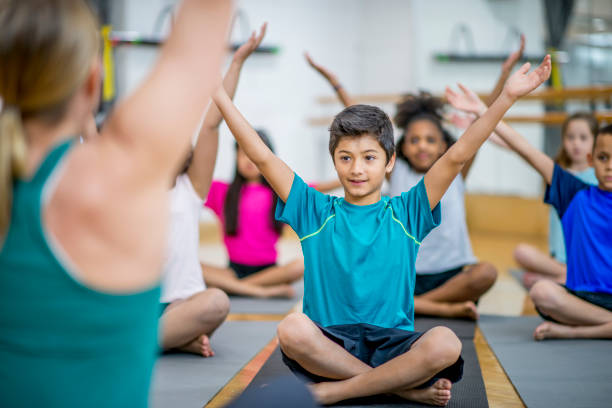International Kids Yoga Day
Every year on April 4th, children across the world unroll their yoga mats to celebrate International Kids Yoga Day, a vibrant initiative dedicated to fostering physical, mental, and emotional well-being through the playful practice of yoga. Founded in 2016 by Teresa Power, an internationally recognized children’s yoga expert and bestselling author of The ABCs of Yoga for Kids, this day has grown into a global movement, uniting over 500,000 children from 45 countries and all 50 U.S. states in a shared moment of mindfulness and movement. The choice of April 4th is symbolic—it marks a time of renewal in spring (or autumn in the Southern Hemisphere), aligning with the day’s mission to rejuvenate young minds and bodies amid the pressures of modern life, from academic stress to digital overload.

At its heart, International Kids Yoga Day is about accessibility and inclusivity. Teresa Power envisioned a day where every child, regardless of socioeconomic background, athletic ability, or prior experience, could reap the benefits of yoga. The cornerstone of the celebration is its five-minute routines, designed to be simple yet impactful. These routines—available in 11 languages and adaptable for classrooms, homes, or community centers—feature poses like Flamingo (balancing on one leg), Tree (for focus), and Rocking Horse (a playful backbend), all crafted to feel like an adventure rather than exercise. For children with disabilities, an adaptive routine offers seated or modified poses, ensuring no one is left out. The day’s magic lies in its collective energy: at 11:00 AM local time, kids from Tokyo to Toledo synchronize their movements, creating a ripple of positivity across time zones.
The day’s activities extend far beyond poses. Schools and families are encouraged to weave yoga into creative projects, such as yoga-themed crafts (decorating mats or pose bookmarks) or outdoor sessions in parks to connect with nature. Virtual participation has also blossomed, with livestreamed events allowing global connections—a testament to the day’s evolution in the digital age. For teens, a special pre-teen routine introduces more challenging poses like Eagle (a balance-intensive twist), while games like "Yoga Pose Parade" turn practice into playful competition. Teresa Power emphasizes that these activities aren’t just about fitness; they’re tools to build life skills—confidence, patience, and emotional regulation—that help children navigate challenges like ADHD, autism, or everyday stress.
The historical roots of the day trace back to yoga’s ancient origins in India, where practices were first documented in texts like the Rigveda (1200–900 B.C.) as methods to harmonize mind and body. Teresa Power’s innovation was to strip away complexity, making yoga relatable to children through storytelling and imagination. Her books, such as Little Mouse Adventures, blend yoga poses with narratives, transforming sessions into journeys where kids "become" animals or elements of nature. This approach has resonated globally; by 2025, the event’s 10th anniversary, participation had surged, with ambassadors—teachers, librarians, and yoga instructors—leading sessions everywhere from Aviva Senior Living in Ohio (where seniors joined kids for adaptive yoga) to rural classrooms in Africa.
Why does this day matter? Modern childhood is fraught with challenges: screen fatigue, rising obesity rates, and mental health struggles exacerbated by societal pressures. Research highlights yoga’s role in boosting immunity, enhancing academic focus, and reducing cortisol levels. Schools report fewer behavioral issues post-yoga sessions, while parents cherish the bonding time—a rarity in hectic schedules. The day also tackles health disparities; free resources ensure underserved communities can participate, aligning with Power’s belief that wellness should be a right, not a privilege.
Looking ahead, International Kids Yoga Day is poised to embrace technology and personalization. Wearable devices could soon track children’s progress, while AI might tailor routines to individual needs. The rise of hybrid events ensures remote learners aren’t excluded, and partnerships with health organizations aim to integrate yoga into public health curricula. Merchandise like yoga-themed teddy bears and family beach towels (sold to fund the initiative) further embed yoga into daily life.
In essence, April 4th is more than a date—it’s a global pledge to nurture healthier, happier generations. As Teresa Power often says, "Just five minutes a day can change a child’s life." Whether through a giggling Flamingo pose or a quiet moment in Do Nothing Pose, International Kids Yoga Day plants seeds of resilience and joy that blossom far beyond the mat.
Photo from iStock
0 Comment to "International Kids Yoga Day: A Global Celebration of Wellness and Joy"
Post a Comment